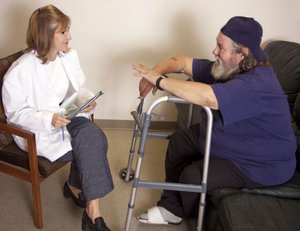
The Art of Self-Disclosure – Part 1
Revealing, Relating and Risk-taking to Improve Communication
*Names have been changed to protect privacy.*
Jeannette Patterson likes to talk. She’ll talk to the person standing in front of her at the checkout line just as easily as she would talk to her doctor. From corns to cancer to her granddaughter’s most recent accomplishments, Jeannette will share details about her life that other people would never disclose. Her husband Carl, for example, would never talk about these things publicly. You won’t find him talking about personal or emotional issues with family members either. If pushed, he’ll write a note. However, after his wife was diagnosed with colon cancer, Carl and his wife talked.
They talked about her medications and doctor’s visits. However, conversations about emotions were not so easy. She didn’t want to upset him, but he kept seeing her cry. He cried when she wasn’t looking.
Then, there were the accidents after part of her large intestine was removed in surgery. Without warning, she’d defecate on herself. Eventually, she got over the embarrassment of this happening in front of her husband. Carl reminded her to take care when eating and pack extra clothes and towels before going out. But for three years, her body repeatedly betrayed her in public, drawing people’s attention. She “rolled with the punches” and started talking.
“I needed to talk about it, to spread information and convince people to get colonoscopies in case this happened to them,” Jeannette said.
The Patterson family story illustrates the reality of talking about cancer. Some people want to talk about it. Others do not. Sometimes you can plan for conversations. Other times the conversation comes to you, ready or not. Talking about your thoughts and feelings with a partner or close friend is considered an important part of intimate relationships and can make you feel better. This article provides insights to help those who have been touched by cancer understand why some people share and others withdraw. It also offers guidance to help facilitate conversations about cancer.
Evaluate How Much You Disclose
After a cancer diagnosis, patients and caregivers usually turn to their significant other (SO) or close friends for emotional support. Everyone has a different comfort level when it comes to talking about their thoughts and feelings. This can affect communication within relationships. Maybe the friend is a “fixer” and responds to every conversation with advice on how to solve the problem, but the patient just wants to be heard. Maybe a patient stays silent to avoid being a burden on the family, but the significant other wants to help out and needs more information. Limited communication in intimate relationships can cause stress and negatively affect a patient’s health.
Think about the communication in your most intimate relationships by answering the following questions:
- Have you held back from talking to your SO/friend about your thoughts and feelings? To what extent?
- Has it been helpful when you’ve talked about your thoughts and feelings?
- How supportive has your SO/friend been?
- Has your SO/friend withdrawn or been critical?
- Has your SO/friend also shared his/her thoughts and feelings with you?
The following exercise can help you better understand when, how, and with whom you would be comfortable talking about cancer.
To Disclose or Not to Disclose
Are you having trouble deciding whether you should disclose personal information to someone or not? This activity can help you evaluate your readiness for sharing personal information.
Ask yourself these questions:
- What is my private information?
- Who am I considering telling the information?
- Why do I feel I need or want to share it now?
- How will telling this person my private information make me feel?
- Are there other positive or negative consequences of telling this person this information?
Evaluate the pros and cons of sharing the private information using this table:
| Pros to Telling the Private Information | Cons to Telling the Private Information |
| Pros to Not Telling the Private Information | Cons to Not Telling the Private Information |
Consider the situation before moving forward (check all that apply):
- This person has a right to know the information I have been withholding.
- I have a good enough relationship with this person to tell them personal information.
- This person is a friend or family member I can trust.
- I absolutely must disclose this information to this person to continue functioning.
- This conversation needs to happen in person.
- This is a private conversation.
- I have to ask for a time to meet in private with this person for this conversation.
- I am ready to share this personal information with this person.
- I need to practice what I am going to say.
- I know how much I want to share.
- I know what I want to keep to myself.
- Keeping things to myself will benefit me more than cost me.
- I am prepared for the person’s emotional reaction, pity, and other unexpected reactions.
- I am prepared for my emotions that may arise before, during, and after the conversation.
What do your answers indicate about sharing the information? Is there anything else you should consider before disclosing the information?

This research project was funded by a grant from the National Cancer Institute (CA144235; Dr. Wayne Beach, San Diego State University, Principal Investigator). Co-investigators included Dr. David Dozier from San Diego State University, and Mary Buller, Dr. Valerie Myers, and Dr. David Buller from Klein Buendel, Inc.